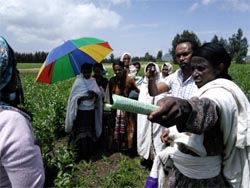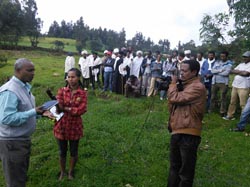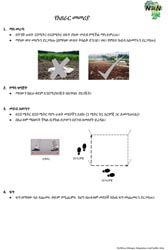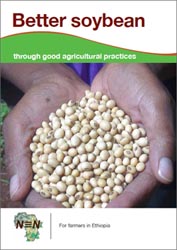In this cropping season, N2Africa-Ethiopia has planned to reach more than 5000 farmers in 24 Woredas (districts) through its research and development partners (Federal and Regional Agricultural Research Institutes and Hawassa University). The Woredas have been identified as potential pulse growing areas earlier and located at four regions in Ethiopia (Amhara, Benishangul-Gumuz, Oromia and Southern Region). The four clusters of agronomy activities for the 2014 season (the diagnostic, demonstration, adaptation and researcher-managed-agronomy) were executed in close collaboration between N2Africa and its partners, which altogether comprising nine implementing centers and district agricultural offices. The planting of common bean, soyabean and faba bean has been completed (end of June – early July, 2014); and chickpea planting is in progress and may extend, depending on the location, throughout September. Improved seeds and inoculants were provided along with appropriate training to participants which constituted of technical experts (trainers), districts administrators, extension workers and farmers. The N2Africa team have given technical backstopping and facilitated the linkage of input suppliers (improved seeds and inoculants) to farmers via our partners. The sources of the inoculants were private inoculant producer (Menagesha Biotechnology Industry plc) and government institutions (Holeta Agricultural Research Center and National Soil Testing Center).
The customized versions of the agronomic protocols for diagnostic, demonstration, adaptation & researcher-managed-agronomy trials; and field books for farm typology and agronomic data collection were dispatched to partners. A leaflet prepared in Amharic has been distributed to farmers with inputs for chickpea adaptation trials. In addition, plastic rain gages (sourced from Wageningen) were distributed and installed on trial sites to collect rainfall data for target sites far away from meteorology stations.
The mid-season (vegetative stage) field evaluations have been conducted in four Woredas (Dabat, Debark, Farta & Yelmana Densa in Amhara). These evaluations were aimed at demonstrating and getting feedback on N2Africa technologies. The events was attended by different stakeholders including research directors and technicians, Zonal and Woreda Officials, development agents and male and female farmers. On the occasions, two farmers’ groups, women and men, were formed each making separate evaluations of the diffract treatments. The groups were chaired by elected farmers and the researcher served as secretary. The evaluation criteria were set by the farmers and based on the crop vigor, growth and development, i.e. height, stalk thickness, leafiness, flower intensity, pod setting, uniformity, resistance to disease and waterlogging. In general, the improved varieties (which have been tested during the bridging phase, 2013 cropping season) responded well to inoculation and application of P fertilizer. The impacts of legume technology (proper crop management, use of improved verities, inoculation and P fertilizer) apparent on better performances of N2Africa plots. The demonstration and field day occasions had mass-media coverage (television and radio news coverage). Similar farmer’s field days will be organized and demonstration and field evaluation of the legume technologies on N2Africa plots will continue in other target Woredas.
|
Figure 1. Land preparation for common bean trial at Bako
|
Figure 2. Active participation of women farmers in the field evaluation of faba bean trials at Dabat woreda |
Figure 3. Adet Agricultural Research Center Director, Anteneh Abewa, describing the N2Africa efforts to mass-media at Farta woreda |
In collaboration with ASHC and WUR, two extension materials (booklets) on common bean and soyabean have been prepared, now at final stage and will be made available for extension workers and development agents to support the dissemination of legume technologies. In addition an adaptation leaflet has been translated into Amharic language and for use in adaptation activities.
|
|
|
|
To strengthen the capacity of private input suppliers, their connectedness with farmers and stimulate the dissemination of technologies, N2Africa is also working with AGRA- Scaling Seeds and Technologies Partnership in Africa (AGRA-SSTP) in developing proposals for grants to promote the commercialization, distribution and adoption of improved chickpea seeds, inoculants and other key technologies facilitating a consortium of private and public sectors.
To ensure the production of quality inoculants by private and public institutions, it is necessary to continue isolation of new strains and evaluate their symbiotic effectiveness in reference to national and international elites currently in use. To this end, the national rhizobiology team engaged in rhizobia research has been convened and shared the rhizobiology master plan of N2Africa. During the meeting, short and long term plans have been discussed and agreements reached to collect elite strains available in the different academic and research institution in Ethiopia, evaluate their symbiotic effectiveness to target legumes and make these available for inoculant producers (private and public institutions). N2Africa will take leading role in facilitating and networking of institutions engaged in rhizbiology research and development activities. In fact, N2Africa-Ethiopia is now getting recognition and being consulted (by NGOs and development projects) on issues concerning legume bio-inoculants.
In line with N2Africa’s plan to contribute to national intuitional capacity building, four candidates (one PhD and three Masters) have been selected to pursue their education. The PhD student undertake his study at Wageningen University, in the Netherlands while the Msc students are liaise with universities at home (Hwassa and Haramaya Universities).
By the N2Africa-Ethiopia Team (Endalkachew, Birhan and Tamiru)






